★★
“Less an investigation into the genre, than a poorly-conceived freshman term paper.”
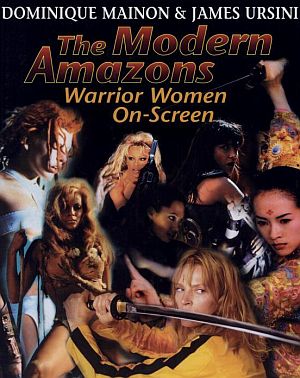 While it’s nice to see our favourite topic here getting some printed love, I can’t say I was impressed with this end result, which struggles to be all things to all women, and ends up not being very good at any of them. There’s no denying the breadth of coverage here, with everything from Sailor Moon to Ilsa getting covered – though they appear rather too willing to stretch the bounds of the term, “Amazons”. I mean: Pippi Longstocking? The coverage is grouped into various areas: monster killers, super-sleuths, fur bikinis, etc. along with additional essays on more specific themes, such as the representation of women as felines. It’s a somewhat lumpy distinction, which occasionally makes for strange bed-fellows, but occasionally comes up with some thought-provoking nuggets.
While it’s nice to see our favourite topic here getting some printed love, I can’t say I was impressed with this end result, which struggles to be all things to all women, and ends up not being very good at any of them. There’s no denying the breadth of coverage here, with everything from Sailor Moon to Ilsa getting covered – though they appear rather too willing to stretch the bounds of the term, “Amazons”. I mean: Pippi Longstocking? The coverage is grouped into various areas: monster killers, super-sleuths, fur bikinis, etc. along with additional essays on more specific themes, such as the representation of women as felines. It’s a somewhat lumpy distinction, which occasionally makes for strange bed-fellows, but occasionally comes up with some thought-provoking nuggets.
My biggest qualm is the almost entire lack of any criticism; there’s entirely too much description, and the plot synopses flow like free beer. While it is mentioned that Catwoman was a massive flop, the writers seem to have no interest in analyzing the reasons why. An entire chapter could easily be written on the failures, and looking at why they bombed, but these aspects are ignored. Certainly, there are worthwhile aspects [I must get round to seeing Hannie Caulder], but these are countered by lurid sensationalism, such as “the practice of Japanese schoolgirls selling their panties to old men on the street” – which makes it sound as if, like Starbucks, there’s one on every corner. Generally, the volume has no stance on differentiating the good of the genre from the bad, instead just throwing examples at the reader. A more subjective approach – and perhaps fewer, mostly pointless, black and white pics – would be much preferred.
I also hated the lack of any useful index. Want to see what the authors think of, say, Dark Angel? You’re out of luck, because there’s absolutely no index by title. The only one is ordered by actress – and even after you find Jessica Alba, you are uselessly directed, not to any specific pages, but to multiple chapters; two, six and seven in this case. Somewhere in the hundred pages covered by those three sections, you’ll find it. Have fun with that. In the end though, it’s simply impossible to take seriously any volume that decides The League of Extraordinary Gentlemen is worth about five times as much space as Faster, Pussycat! Kill! Kill!, and which can apparently find no room at all for Dirty Pair, Sybil Danning or Cutthroat Island. A sadly-wasted opportunity.
By: Dominique Mainon and James Ursini
Publisher Limelight Editions, 2006. $24.95





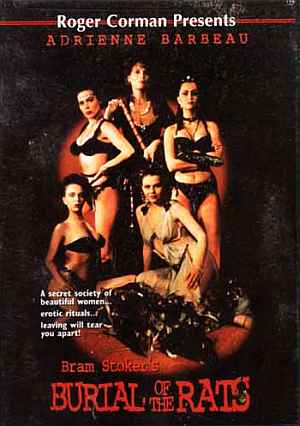 This can only be described as utterly mad. Bram Stoker is kidnapped by a group of bikini-clad female vigilantes, ruled over by “the Pied Piper’s twisted sister” (Barbeau), who can control rats with her flute (when not decapitating them in her rodent-sized guillotine, I kid you not). He is coerced into becoming one of them because the Queen decided his writing skills could aid their PR skills, striking fear into their targets with his eye-witness accounts of the raids where the extract vengeance on evil men. Of course, one of the clan (Ford) falls for him, but when she is captured by the authorities, her colleague must mount a raid to rescue her. Meanwhile, Stoker’s father is trying to find his son. Oh, and I did I mention the topless ballet which is apparently the women’s chief source of entertainment? No wonder Barbeau permanently wears a pained expression. [Though she now looks back and
This can only be described as utterly mad. Bram Stoker is kidnapped by a group of bikini-clad female vigilantes, ruled over by “the Pied Piper’s twisted sister” (Barbeau), who can control rats with her flute (when not decapitating them in her rodent-sized guillotine, I kid you not). He is coerced into becoming one of them because the Queen decided his writing skills could aid their PR skills, striking fear into their targets with his eye-witness accounts of the raids where the extract vengeance on evil men. Of course, one of the clan (Ford) falls for him, but when she is captured by the authorities, her colleague must mount a raid to rescue her. Meanwhile, Stoker’s father is trying to find his son. Oh, and I did I mention the topless ballet which is apparently the women’s chief source of entertainment? No wonder Barbeau permanently wears a pained expression. [Though she now looks back and 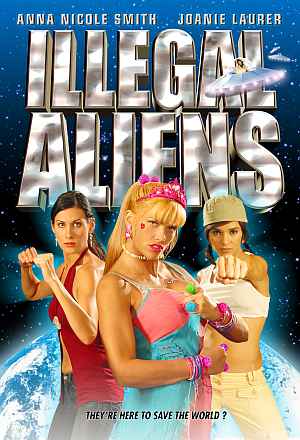 Okay, her swansong won’t be up there with James Dean’s or Bruce Lee’s, but this does at least sense its own idiocy, rendering the movie somewhat bullet-proof, critically speaking. It’s supposed to be dumb, wildly implausible and hideously over-acted. So condemning it for these flaws is complaining because your hotdog tastes of meat. A trio of shape-shifting aliens land on Earth to protect it from the scum of the universe. Thanks to their first encounter with our culture coming in the shape of a porno mag, they opt for the form of attractive women. Two end up getting jobs as FX/stunt people in Hollywood – a sadly underexplored angle – while the third is…Anna Nicole Smith. Then their nemesis (Laurer, the actress formerly known as Chyna) turns up, taking over the body of a mobster’s wife, and prepares to bring about the end of the world. Can she be stopped?
Okay, her swansong won’t be up there with James Dean’s or Bruce Lee’s, but this does at least sense its own idiocy, rendering the movie somewhat bullet-proof, critically speaking. It’s supposed to be dumb, wildly implausible and hideously over-acted. So condemning it for these flaws is complaining because your hotdog tastes of meat. A trio of shape-shifting aliens land on Earth to protect it from the scum of the universe. Thanks to their first encounter with our culture coming in the shape of a porno mag, they opt for the form of attractive women. Two end up getting jobs as FX/stunt people in Hollywood – a sadly underexplored angle – while the third is…Anna Nicole Smith. Then their nemesis (Laurer, the actress formerly known as Chyna) turns up, taking over the body of a mobster’s wife, and prepares to bring about the end of the world. Can she be stopped? There’s no doubt this film is, if not cashing in on her death, certainly shrugging its shoulders and taking advantage of an unfortunate situation. I don’t really blame them for that, even if anyone looking for skin will be wasting their time here. In sharp contrast to her previous, ah, body of work, AN’s clothes remain on; as exploitation goes, this is tame and restrained. And that may be the main problem: a failure by the makers to decide which way to go. SF/action or all-out comedy? There’s enough of each to suggest, with greater commitment, either might have worked better. Instead, it comes off as somewhat lukewarm – can’t say we were ever bored, yet I can’t say I was ever more than mildly amused.
There’s no doubt this film is, if not cashing in on her death, certainly shrugging its shoulders and taking advantage of an unfortunate situation. I don’t really blame them for that, even if anyone looking for skin will be wasting their time here. In sharp contrast to her previous, ah, body of work, AN’s clothes remain on; as exploitation goes, this is tame and restrained. And that may be the main problem: a failure by the makers to decide which way to go. SF/action or all-out comedy? There’s enough of each to suggest, with greater commitment, either might have worked better. Instead, it comes off as somewhat lukewarm – can’t say we were ever bored, yet I can’t say I was ever more than mildly amused.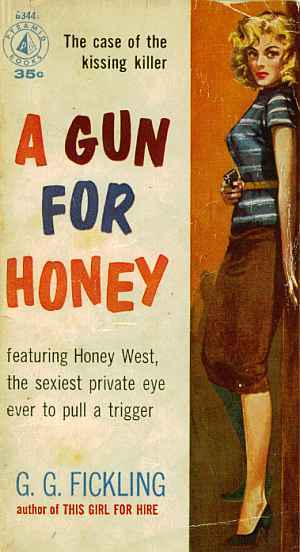 Honey West is best known as the heroine of a mid-60’s TV show created by Aaron Spelling, starring Anne Francis. But her origins actually date back almost a decade further, to a series of pulp detective novels written by Forest Fickling, under the vaguely-pseudonymic name of G.G.Fickling – his wife was Gloria, which may explain the choice. The heroine is a private eye, who follows her father into the profession, after he was killed on the job. These adventures, judging by A Gun for Honey, are rather more hard-boiled, and occasionally risque, than the TV show, though even in the book, the characters never actually seem to do “it”.
Honey West is best known as the heroine of a mid-60’s TV show created by Aaron Spelling, starring Anne Francis. But her origins actually date back almost a decade further, to a series of pulp detective novels written by Forest Fickling, under the vaguely-pseudonymic name of G.G.Fickling – his wife was Gloria, which may explain the choice. The heroine is a private eye, who follows her father into the profession, after he was killed on the job. These adventures, judging by A Gun for Honey, are rather more hard-boiled, and occasionally risque, than the TV show, though even in the book, the characters never actually seem to do “it”.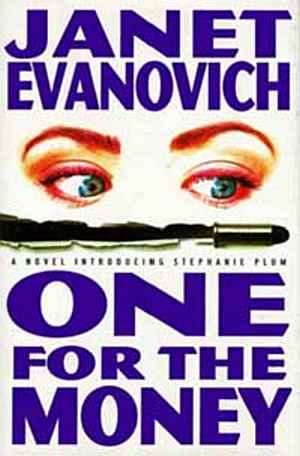 Former romance writer Evanovich switched genres and hit paydirt immediately with the first in the series, describing the adventures of former Newark lingerie buyer Stephanie Plum. She’s forced, through financial misadventure, to find a new job, and goes for a job filing paperwork for her bail bondsman cousin, but ends up hunting FTA’s (those who Failed To Appear for their court date) instead. She starts at the top, with suspended cop Joe Morelli, who has vanished after being accused of shooting an unarmed man. But as the witnesses to the incident start to die, Plum realises things may not be what they seem. The novice bounty huntress is well out of her depth, not least when she crosses psycho boxer Ramirez – until help comes from an unexpected source…
Former romance writer Evanovich switched genres and hit paydirt immediately with the first in the series, describing the adventures of former Newark lingerie buyer Stephanie Plum. She’s forced, through financial misadventure, to find a new job, and goes for a job filing paperwork for her bail bondsman cousin, but ends up hunting FTA’s (those who Failed To Appear for their court date) instead. She starts at the top, with suspended cop Joe Morelli, who has vanished after being accused of shooting an unarmed man. But as the witnesses to the incident start to die, Plum realises things may not be what they seem. The novice bounty huntress is well out of her depth, not least when she crosses psycho boxer Ramirez – until help comes from an unexpected source…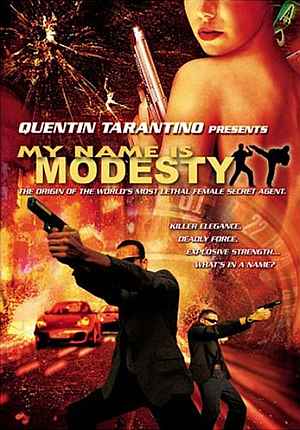 The word is, Miramax made this in order to keep their rights to the Modesty Blaise series active: I imagine a clause reverted them back to creator Peter O’Donnell, if unused within X years. Tarantino wanted to direct it, but couldn’t find the time, hence this stop-gap directed by journeyman Spiegel, who’s familiar with Quentin cast-offs, having also directed From Dusk Till Dawn 2. Shot in 18 Romanian days, the limitations of time and budget are clear [save admittedly copious flashbacks, the movie is almost all set in one location], but given them, it’s by no means a disaster. The main failing is the lack of action; we don’t see alleged jet-setting, goddess of kick-butt Blaise do much at all until the last few minutes. This may be because Staden looks as if she’d struggle to move forward in a stiff breeze; seeing her trading blows is unconvincing, and the fight choreographer should have focused on speed and/or agility instead. Though in terms of presence and steely gaze, she does fit the part well.
The word is, Miramax made this in order to keep their rights to the Modesty Blaise series active: I imagine a clause reverted them back to creator Peter O’Donnell, if unused within X years. Tarantino wanted to direct it, but couldn’t find the time, hence this stop-gap directed by journeyman Spiegel, who’s familiar with Quentin cast-offs, having also directed From Dusk Till Dawn 2. Shot in 18 Romanian days, the limitations of time and budget are clear [save admittedly copious flashbacks, the movie is almost all set in one location], but given them, it’s by no means a disaster. The main failing is the lack of action; we don’t see alleged jet-setting, goddess of kick-butt Blaise do much at all until the last few minutes. This may be because Staden looks as if she’d struggle to move forward in a stiff breeze; seeing her trading blows is unconvincing, and the fight choreographer should have focused on speed and/or agility instead. Though in terms of presence and steely gaze, she does fit the part well.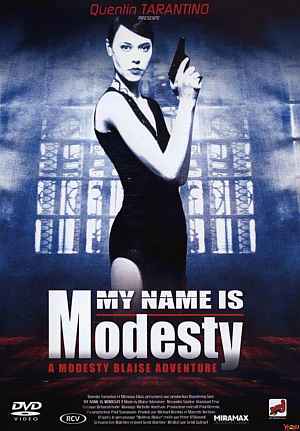 I remember the books from my youth, and the huge disappointment I felt when I saw the 1966 camp abortion starring Monica Vitti [there was also an 1982 TV pilot, with Ann Turkel, which I haven’t found]. This “origin” story is an improvement, at least taking the characters seriously. Blaise is trapped in a casino by a robber with a grudge against the owner (Waldau), and as they wait for the guy with the safe combination to arrive, she trades stories of her past for the freedom of the other hostages, Arabian Nights style, almost. I’d be somewhat curious to see the original cut, which apparently ran nearly two hours. Now, it’s barely 70 minutes between Bond-esque opening and closing credits, yet is still pretty talky, Blaise and her mentor (Pearson) meandering between the Balkans and Morocco.
I remember the books from my youth, and the huge disappointment I felt when I saw the 1966 camp abortion starring Monica Vitti [there was also an 1982 TV pilot, with Ann Turkel, which I haven’t found]. This “origin” story is an improvement, at least taking the characters seriously. Blaise is trapped in a casino by a robber with a grudge against the owner (Waldau), and as they wait for the guy with the safe combination to arrive, she trades stories of her past for the freedom of the other hostages, Arabian Nights style, almost. I’d be somewhat curious to see the original cut, which apparently ran nearly two hours. Now, it’s barely 70 minutes between Bond-esque opening and closing credits, yet is still pretty talky, Blaise and her mentor (Pearson) meandering between the Balkans and Morocco.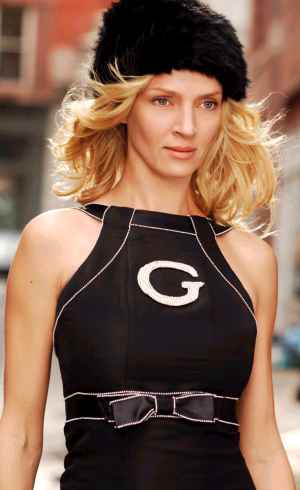 There’s certainly plenty of potential in the idea: how do you break up with your girlfriend, when she’s not just needy and possessive, but also has superhuman strength, the ability to fly and can boil your fishtank with her gaze? And the casting is, in general, excellent, too. Matt (Wilson) is an endearing everyman, and Thurman is perfect for capturing the mix of neuroses and power in G-Girl – her sequence where she pouts and refuses to save New York from a rogue missile is great. Izzard, naturally, steals almost every scene as supervillain Professor Bedlam [or “Barry”, as G-Girl knows him], though Riann Wilson matches him as Matt’s best friend, who talks a far better sexual game than he actually plays.
There’s certainly plenty of potential in the idea: how do you break up with your girlfriend, when she’s not just needy and possessive, but also has superhuman strength, the ability to fly and can boil your fishtank with her gaze? And the casting is, in general, excellent, too. Matt (Wilson) is an endearing everyman, and Thurman is perfect for capturing the mix of neuroses and power in G-Girl – her sequence where she pouts and refuses to save New York from a rogue missile is great. Izzard, naturally, steals almost every scene as supervillain Professor Bedlam [or “Barry”, as G-Girl knows him], though Riann Wilson matches him as Matt’s best friend, who talks a far better sexual game than he actually plays.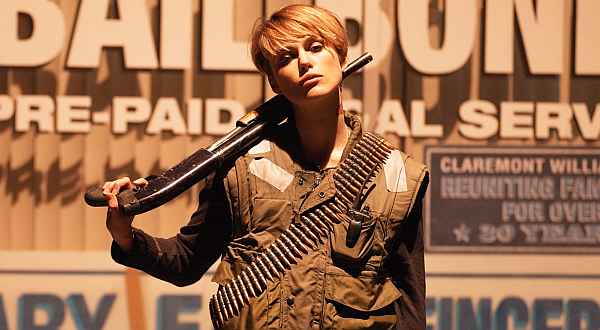 ★★½
★★½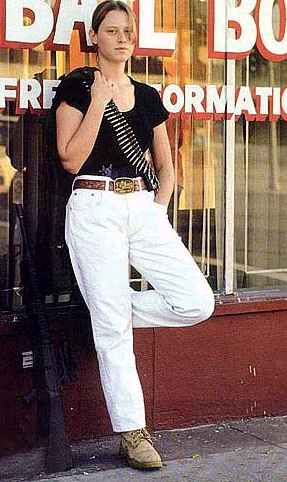 “This is based on a true story…sort of” is how the pre-credit disclaimer goes. Which does, at least, show far more honesty by Tony Scott than the usual claims in such things – Blair Witch and Wolf Creek shuffle their feet nervously. Unfortunately, my response would have to be, “This is a watchable movie…sort of.” Scott brings his usual, hyper-kinetic style to the table, but I was prepared for that and so didn’t mind it. No, the major problem was the derailment of the film from the potentially fascinating and probably unique character of Domino, into yet another heist movie. So instead of any insight into personality, we get to watch a bunch of gangsters and low-lives, of whom Domino is merely one, double-cross each other. It’s an hour of watching the corpse of Barbaro being beaten, if you get my drift; even Scott has been here before, to better effect, in True Romance.
“This is based on a true story…sort of” is how the pre-credit disclaimer goes. Which does, at least, show far more honesty by Tony Scott than the usual claims in such things – Blair Witch and Wolf Creek shuffle their feet nervously. Unfortunately, my response would have to be, “This is a watchable movie…sort of.” Scott brings his usual, hyper-kinetic style to the table, but I was prepared for that and so didn’t mind it. No, the major problem was the derailment of the film from the potentially fascinating and probably unique character of Domino, into yet another heist movie. So instead of any insight into personality, we get to watch a bunch of gangsters and low-lives, of whom Domino is merely one, double-cross each other. It’s an hour of watching the corpse of Barbaro being beaten, if you get my drift; even Scott has been here before, to better effect, in True Romance. The film is filled with distracting stunt casting in the minor roles. This includes Christopher Walken, Mena Suvari, Lucy Liu, Jacqueline Bisset, two guys from Beverly Hills 90210 playing themselves, Macy Gray, Tom Waits and even Jerry Springer, though the episode of his show here is far duller and more earnest than the real thing. Walken is, inevitably, the only one to make much of an impression, playing a reality TV producer who wants to make Domino a star. He’s described as having the attention span of a ferret on crystal meth, probably an adequate metaphor for the film as a whole. It lacks the patience to stay with and develop any of the characters, so sniffs around them for two minutes, before scurrying off to find someone else instead.
The film is filled with distracting stunt casting in the minor roles. This includes Christopher Walken, Mena Suvari, Lucy Liu, Jacqueline Bisset, two guys from Beverly Hills 90210 playing themselves, Macy Gray, Tom Waits and even Jerry Springer, though the episode of his show here is far duller and more earnest than the real thing. Walken is, inevitably, the only one to make much of an impression, playing a reality TV producer who wants to make Domino a star. He’s described as having the attention span of a ferret on crystal meth, probably an adequate metaphor for the film as a whole. It lacks the patience to stay with and develop any of the characters, so sniffs around them for two minutes, before scurrying off to find someone else instead.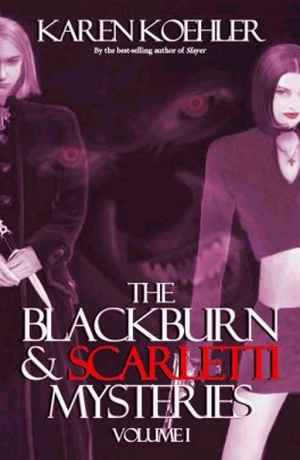 Take an FBI agent with some psychic ability, January Blackburn, and partner her with part-vampire Catholic priest, Dorian Scarletti. Intrigued? Me too. That’s the premise of the three stories in this book, where our odd couple investigate paranormal crimes around the US. The results are somewhat uneven, yet with much promise: Blackburn is probably a more interesting character, possessing both great inner strength, and quirks that make her vulnerable and more human. In contrast, Scarletti, thus far, seems a bit like a “vampire by numbers”, with all the standard moping around, relationship angst and so on, too familiar to be of more than passing interest. Though, must say, his weapon of choice – hundreds of cross-shaped throwing knives inside his coat – is worth cool points in my book (even if I presume he doesn’t go through airports).
Take an FBI agent with some psychic ability, January Blackburn, and partner her with part-vampire Catholic priest, Dorian Scarletti. Intrigued? Me too. That’s the premise of the three stories in this book, where our odd couple investigate paranormal crimes around the US. The results are somewhat uneven, yet with much promise: Blackburn is probably a more interesting character, possessing both great inner strength, and quirks that make her vulnerable and more human. In contrast, Scarletti, thus far, seems a bit like a “vampire by numbers”, with all the standard moping around, relationship angst and so on, too familiar to be of more than passing interest. Though, must say, his weapon of choice – hundreds of cross-shaped throwing knives inside his coat – is worth cool points in my book (even if I presume he doesn’t go through airports). This appears to be aiming for a leg-up on The Descent bandwagon and its theme of “chicks vs. cave-dwelling monsters in a remote wilderness”; though there’s only one of each here, rather than it being a team sport. “Troubled young ranger” Danielle St. Clair (Vincent) is atop a remote tower, watching out for fires, but a careless use of dynamite unleashes an ancient Indian evil that’s been trapped in a cave for centuries. Fortunately, despite said centuries, the monster still knows how to disable satellite dishes and trash Jeeps, as well as ripping the heads off everyone in the area it meets – except for St. Clair, of course, whom it merely terrorizes. The inevitable native American (Schweig) gets wheeled on for one scene of indigestible exposition, trotting out the usual cliches about how we’ve lost touch with our inner child, or some such New Age guff. Not that the beast cares much, I was pleased to see.
This appears to be aiming for a leg-up on The Descent bandwagon and its theme of “chicks vs. cave-dwelling monsters in a remote wilderness”; though there’s only one of each here, rather than it being a team sport. “Troubled young ranger” Danielle St. Clair (Vincent) is atop a remote tower, watching out for fires, but a careless use of dynamite unleashes an ancient Indian evil that’s been trapped in a cave for centuries. Fortunately, despite said centuries, the monster still knows how to disable satellite dishes and trash Jeeps, as well as ripping the heads off everyone in the area it meets – except for St. Clair, of course, whom it merely terrorizes. The inevitable native American (Schweig) gets wheeled on for one scene of indigestible exposition, trotting out the usual cliches about how we’ve lost touch with our inner child, or some such New Age guff. Not that the beast cares much, I was pleased to see.